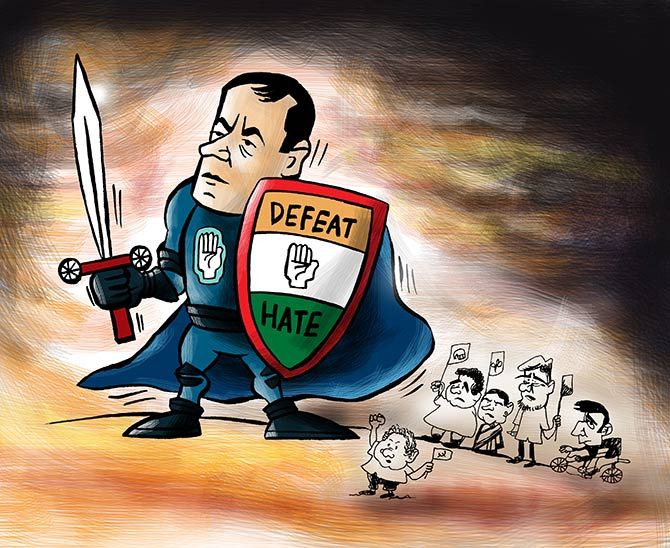 | « Back to article | Print this article |
'There is little doubt that his exertions are among the reasons why Narendra Damodardas Modi routinely lambastes the dynasty at nearly all his rallies, suggesting that he regards the Congress's First Family as a bigger threat than any other political formation,' argues Amulya Ganguli.
Illustration: Uttam Ghosh/Rediff.com

It is odd that in an electoral battle which is being seen by the national Opposition as a contest between the multicultural 'idea' of India and an insular, theocratic Hindu rashtra, virtually the entire burden of the anti-BJP campaign is being borne by Rahul Gandhi.
The previously reclusive scion of the Nehru-Gandhi dynasty has shed his reserved nature to engage in a kind of political barnstorming which has not been seen from anyone in his party in recent years.
Evidently, there is a realisation in the Congress that its earlier smug attitude of resting on past laurels is no longer sustainable in the face of a highly energetic opponent who appears to be rolling in money.
Given such a formidable challenge, one would have thought that the entire Opposition would gird its loins to take on the adversary in a unified manner which its promised mahagathbandhan or grand alliance presaged.
But no such concerted effort is being made by any of the 20-odd parties which recently attended a rally in Kolkata.
It is not that the Opposition does not have leaders with years of political experience.
The chief ministers of Andhra Pradesh and West Bengal, Nara Chandrababu Naidu and Mamata Banerjee, are among them, as are Nationalist Congress Party leader Sharad Pawar and the two former UP chief ministers, Akhilesh Yadav and Mayawati.
At least two of them -- Mamata Banerjee and Mayawati -- are also believed to harbour prime ministerial ambitions.
Then, there are the Communist leaders, Sitaram Yechury and Prakash Karat, who are known as effective speakers as are the father-and-son duo of Farooq and Omar Abdullah.
But they have all chosen to remain in the background, leaving it to Rahul to lead the charge singlehandedly against a redoubtable adversary.
The only time the others have emerged from the shadows is when a 'mega' rally is organised as by Mamata Banerjee in Kolkata.
Otherwise, they have confined their angst and anger to occasional outbursts on Twitter.
It is possible that their failure to stitch together even mini, state-level alliances (as in UP and Delhi), let alone a maha one, has prevented them from playing a larger role because they are aware of their inadequacies in terms of attracting crowds outside their home provinces.
Moreover, some of them also probably believe that unless they are given a first among equals status, they will not take any initiative and bide their time.
What their caginess has achieved is to enable Rahul to play a leading role, thereby making him the front-runner in the prime ministerial stakes in the Opposition camp.
After all, having stayed back in West Bengal and UP, neither Mamata Banerjee nor Mayawati can suddenly assert their claims for the top job if the opportunity presents itself.
As a result of their reticence, the Congress president's position has undoubtedly been bolstered.
For some, this is as it should be.
After all, the claims of Mamata Banerjee and Mayawati stem from nothing other than state-level influence.
Their parties, too, lack the all-India stature of the Congress, which is gradually finding its feet after the drubbing in 2014.
As its recent successes in the heartland states showed, the 134-year-old party is recovering its pan-India image and that, too, understandably, under its First Family.
It is obvious that if any party can offer the BJP a major challenge at the national level, it is the Congress.
Neither its offshoots like the Trinamool Congress or the NCP with their restricted areas of influence can do so; nor can the other regional parties with their limited bases in Andhra Pradesh or UP or Tamil Nadu.
The Communists, too, despite their sizeable presence in Kerala have become for all intents and purposes regional politicians who cannot be expected to wield even the kind of influence at the national level which Jyoti Basu once did because of his magnetic personality and success in holding together a large coalition in West Bengal for more than two decades.
In view of these deficiencies of the regional parties, it is not surprising that Rahul's name as a prime minister has been endorsed by Karnataka Chief Minister H D Kumaraswamy, DMK President M K Stalin and the RJD's Tejashwi Yadav.
Their suggestions are an acknowledgement of the obvious in the absence of suitable alternatives.
It is also undeniable that Rahul has put behind his unflattering Pappu image of being the poor little rich boy, and his habit of occasionally disappearing from public view, to devote virtually all his time to rev up the moribund party organisation and criss-cross the country, addressing public meetings.
There is little doubt that his exertions are among the reasons why Narendra Damodardas Modi routinely lambastes the dynasty at nearly all his rallies, suggesting that he regards the Congress's First Family as a bigger threat than any other political formation.
It is a left-handed compliment to a party which was down and out with 44 seats five years ago.
If anyone deserves praise for this revival, which did not seem possible at one time, it is Rahul.
Amulya Ganguli is a writer on current affairs.